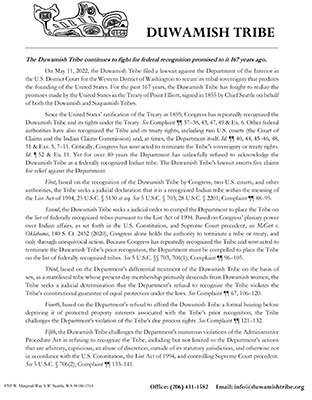Lawsuit for Federal Recognition
February 2025
July 2024
In May of 2022, the Duwamish Tribe filed a lawsuit against the Department of the Interior seeking to compel the U.S. Government to provide the long-awaited federal recognition to the Tribe. The lawsuit marks the most recent chapter in a struggle by the Tribe to gain federal recognition and enforce the promises made to the Duwamish Tribe in the Treaty of Point Elliott.
The Tribe’s previous lawsuit against the Department resulted in the Court ordering the agency to reconsider its decision not to federally recognize the Duwamish Tribe. However, after waiting for more than four years for a new decision, the Department again refused to recognize the Duwamish Tribe. The current lawsuit seeks to correct that error and compel the Department to respect the promises made to the Duwamish over 169 years ago.
In the current lawsuit, the Tribe seeks a judicial declaration that the U.S. Government has already recognized the Tribe, seeks to compel the Department to list the Tribe as a federally-recognized Indian tribe, requests that the Court find the Department unlawfully discriminated against the Tribe, requests the Court find that the Department violated the Tribe’s due process rights, and requests that the Court find the Department’s actions in deciding to deny the Tribe recognition arbitrary, capricious, and unlawful.
In December 2023, the Department asked the judge to remand the Duwamish Tribe’s case back to the agency for consideration for a third time in front of the agency. The Duwamish Tribe opposed this motion in January 2024, arguing to the judge that Department is not entitled to remand because it believes that the Department will not fairly reconsider the Tribe. Remand to the agency would also add further delays, potentially adding substantial time to an already decades long litigation.
The judge will either deny the Department’s motion and consider the Tribe’s substantive arguments, or he will grant the Department’s motion and send the Tribe back to the agency for another review.
Predicting timelines in complicated administrative lawsuits such as the Tribe’s is challenging, simply because there are many procedural questions that must be addressed before the Court can hear the main issues in the case. The Tribe has no ability to determine when the Court will rule on the motion for remand.
On this webpage you can find the full complaint, a summary, links to exhibits, video and photos of an event we hosted at the Longhouse announcing the filing, and media coverage of the lawsuit and acknowledgement efforts. We will post additional resources and legal documents as they become available.
Summary of Complaint
The Duwamish Tribe continues to fight for federal recognition promised to it 167 years ago.
On May 11, 2022, the Duwamish Tribe filed a lawsuit against the Department of the Interior in the U.S. District Court for the Western District of Washington to secure its tribal sovereignty that predates the founding of the United States. For the past 167 years, the Duwamish Tribe has fought to promises made by the United States in the Treaty of Point Elliott, signed in 1855 by Chief Seattle on behalf of both the Duwamish and Suquamish Tribes.
Since the United States’ ratification of the Treaty in 1859, Congress has repeatedly recognized the Duwamish Tribe and its rights under the Treaty. See Complaint ¶¶ 37–38, 43, 47, 49 & Ex. 6. Other federal authorities have also recognized the Tribe and its treaty rights, including two U.S. courts (the Court of
Claims and the Indian Claims Commission) and, at times, the Department itself. Id. ¶¶ 40, 44, 45–46, 48, 51 & Exs. 5, 7–11. Critically, Congress has never acted to terminate the Tribe’s sovereignty or treaty rights.
Id. ¶ 52 & Ex. 11. Yet for over 40 years the Department has unlawfully refused to acknowledge the
Duwamish Tribe as a federally recognized Indian tribe. The Duwamish Tribe’s lawsuit asserts five claims for relief against the Department:
First, based on the recognition of the Duwamish Tribe by Congress, two U.S. courts, and other
authorities, the Tribe seeks a judicial declaration that it is a recognized Indian tribe within the meaning of
the List Act of 1994, 25 U.S.C. § 5130 et seq. See 5 U.S.C. § 703; 28 U.S.C. § 2201; Complaint ¶¶ 88–95.
Second, the Duwamish Tribe seeks a judicial order to compel the Department to place the Tribe on
the list of federally recognized tribes pursuant to the List Act of 1994. Based on Congress’ plenary power
over Indian affairs, as set forth in the U.S. Constitution, and Supreme Court precedent, see McGirt v.
Oklahoma, 140 S. Ct. 2452 (2020), Congress alone holds the authority to terminate a tribe or treaty, and
only through unequivocal action. Because Congress has repeatedly recognized the Tribe and never acted to
terminate the Duwamish Tribe’s prior recognition, the Department must be compelled to place the Tribe
on the list of federally recognized tribes. See 5 U.S.C. §§ 703, 706(1); Complaint ¶¶ 96–105.
Third, based on the Department’s differential treatment of the Duwamish Tribe on the basis of
sex, as a matrilineal tribe whose present-day membership primarily descends from Duwamish women, the
Tribe seeks a judicial determination that the Department’s refusal to recognize the Tribe violates the
Tribe’s constitutional guarantee of equal protection under the laws. See Complaint ¶¶ 67, 106–120.
Fourth, based on the Department’s refusal to afford the Duwamish Tribe a formal hearing before
depriving it of protected property interests associated with the Tribe’s prior recognition, the Tribe
challenges the Department’s violation of the Tribe’s due process rights. See Complaint ¶¶ 121–132.
Fifth, the Duwamish Tribe challenges the Department’s numerous violations of the Administrative
Procedure Act in refusing to recognize the Tribe, including but not limited to the Department’s actions
that are arbitrary, capricious, an abuse of discretion, outside of its statutory jurisdiction, and otherwise not
in accordance with the U.S. Constitution, the List Act of 1994, and controlling Supreme Court precedent.
See 5 U.S.C. § 706(2); Complaint ¶¶ 133–141.
Find out ways you can Stand with the Duwamish
EXHIBITS
Exhibit 1: A current map of the Seattle area showing the modification in the Duwamish watershed, the approximate locations of historic Duwamish villages and longhouses (in blue), as identified by Port of Seattle records and evidence filed in the Court of Claims and other anthropological reports accessed by David Buerge, author of Chief Seattle and the Town that Took his Name.
Exhibit 8: Indian land areas judicially established, Library of Congress (1978), available at https://www.loc.gov/resource/g3701e.ct008649/?r=0.006,0.486,0.37,0.235,0 (last accessed Apr. 7, 2022)
Exhibit 14: Federal Recognition Timeline
Exhibit 15: Duwamish Leadership Timeline
Full Video of Lawsuit Announcement
Via West Seattle Blog
MEDIA COVERAGE
Our lawsuit seeking long overdue federal acknowledgement continues to earn local and national media coverage, including the following:
Erica Zucco, Duwamish Tribe sues federal government to 'secure its tribal sovereignty,' KING5 TV
Brian Oaster, Duwamish Tribe sues Interior in federal court, alleging sex discrimination, High Country News
Amy Radil, Seattle's Duwamish Tribe files new lawsuit seeking federal recognition, KUOW
Isabella Breda, Duwamish recognition fight underscores plight of treaty tribes, Everett Herald
Patricia Murphy & Jennie Cecil Moore, The Duwamish seek federal recognition, KUOW Seattle Now Podcast
Check out the Tribe’s DUWAMISH DRUM webpage for the latest news!





